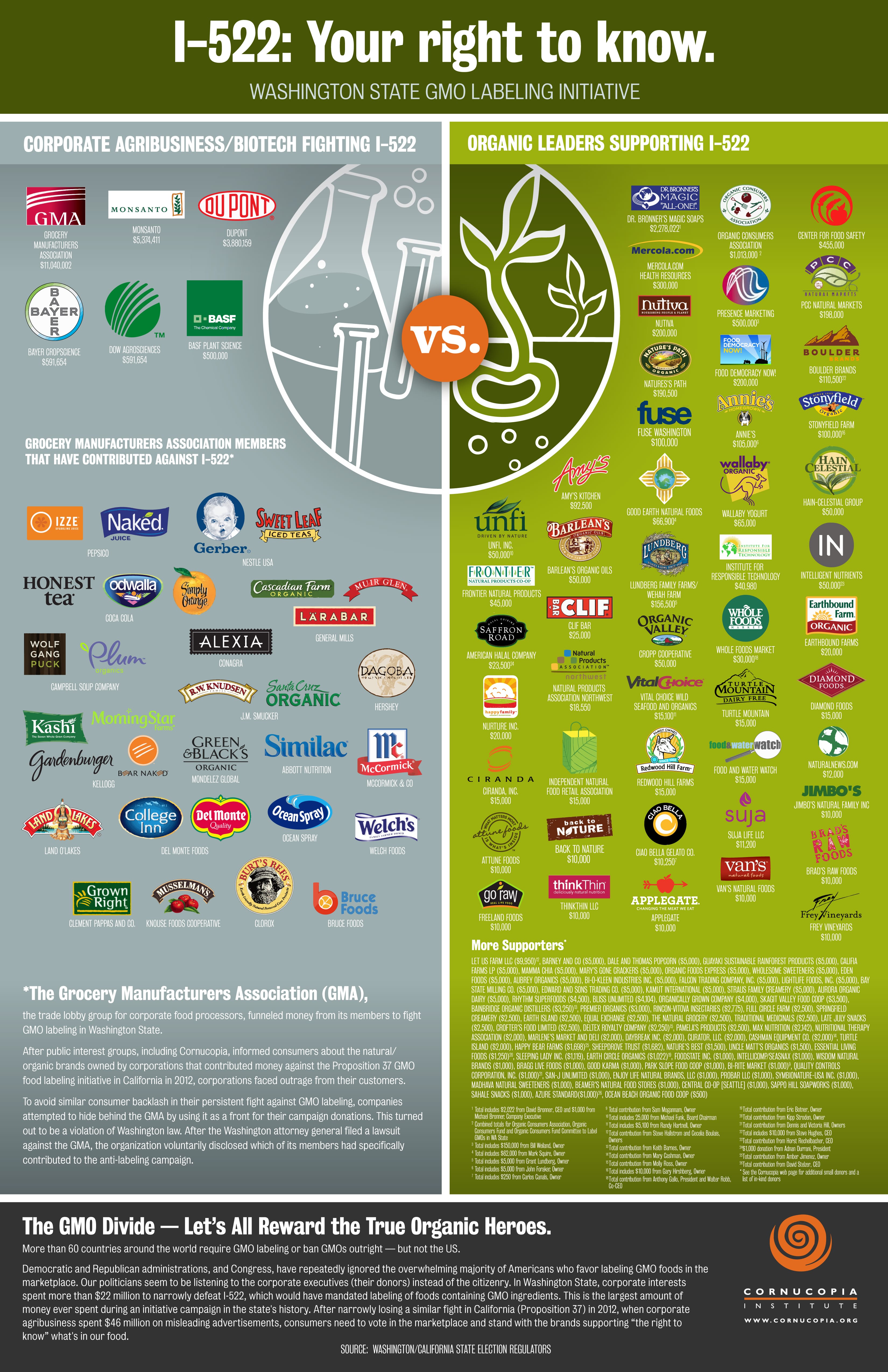Natural/Organic Brands No Longer Hiding Behind Lobbying Organization
The Cornucopia Institute releases shopper’s guide:
pro/con I-522 brands
Proposition I-522, a citizen’s initiative on the November 5 ballot in Washington state that would mandate clear labeling of genetically engineered (GE) ingredients on food packages, has become the most expensive initiative campaign in the state’s history. The high-priced battleground is pitting consumer and farmer advocates against multi-billion-dollar agribusiness corporations.
A number of new opponents to the GMO food labeling proposal were recently revealed following the release of their names by the Grocery Manufacturers Association (GMA), a national business lobbying organization. The GMA had been, apparently in violation of state election law, hiding the identity of its donors who had provided more than $7.2 million to fight the consumer’s right to know what is in their food. The disclosure came shortly after Washington’s Attorney General Bob Ferguson filed a lawsuit demanding the GMA reveal the identity of its secret donors.
With the outing of the GMA’s donors, The Cornucopia Institute has released an updated infographic detailing the financial expenditures of corporate and organizational supporters and opponents of I-522.
(click on the poster image below to view a quick loading larger version,
and then click on it again for an even larger version)
(or click here to view a printable hi-res version)
(click on the poster image above to view a quick loading larger version,
and then click on it again for an even larger version)
Download High Resolution PDF for printing purposes by clicking here
“Consumers might be surprised to find out that some of their favorite organic and natural brands, hiding behind their lobbyist, the Grocery Manufacturers Association, are contributing bushel baskets of cash towards thwarting their right to make informed choices in the supermarket,” says Mark Kastel, Cornucopia’s Codirector.
A similar GMO labeling measure, Prop 37, was narrowly defeated in California last year, with GMA, Monsanto and their allies pouring more than $46 million into their campaign and outspending labeling supporters by five to one. Many prominent organic and natural brands were also exposed in California by Cornucopia for their opposition to GMO food labeling.
“We think the bad press and consumer outrage that many of the GMA member companies received in California, like Kellogs (Kashi), General Mills (Cascadian Farms/Muir Glen) and Smucker’s (Santa Cruz and Knudsen), led to the decision to try to clandestinely hide under the GMA’s cloak with its secret donor approach,” noted Kastel.
The Cornucopia infographic also outlines dozens of organic brands that have heavily contributed to the YES on I-522 campaign, including Dr Bronner’s, Nature’s Path, Annie’s, Stonyfield Farm and Nutiva. It is thought that after the dust settled in California, these groups gained respect and market share after some of the prominent, agribusiness-owned brands lost favor with politically savvy consumers.
A number of prominent organizations have also substantially contributed in support of consumer rights, including the Organic Consumers Association, Center for Food Safety, Mercola.com, Presence Marketing, PCC Natural Markets and Food Democracy Now!.
Earlier this year, the GMA publicly scrubbed its website of its members, a move thought by many to be an effort to mask which corporations/brands were helping underwrite corporate donations against I-522. They weren’t, however, able to remove this web archive detailing their membership.
“In addition to the many companies supporting a YES vote on I-522, there are thousands of individuals making small donations to fund the pro-labeling campaign,” said Goldie Caughlan, a retired nutrition educator for PCC Natural Markets in Seattle and former member of the National Organic Standards Board. “Out-of-state interests, like Monsanto and the many identified GMA members, are flooding our airwaves with misleading ads telling Washington residents how to vote,” Caughlan added.
Mandatory labeling of genetically engineered food at the state level is viewed as a watershed event by many industry observers, given the inaction on the popular proposal at the federal level – with polls showing as high as a 90% in support. Lobbyists for Monsanto, its biotech allies, and GMA in particular, have been credited with bottlenecking a federal labeling law.
After the industry advertising blitz, the most recent polling of Washington state voters indicates a tightening race on the I-522 initiative, with a narrow majority supporting labeling of GMO food ingredients. Opponents of the measure have raised in excess of $17.1 million. The GMA’s share of the NO vote dollar alone, at $7.2 million, is greater than all of the money raised by I-522 supporters, who have collected nearly $6.9 million in favor of a YES vote.
“Consumers and food citizens are increasingly interested in ‘voting with their forks,’ and many want to support companies that share their values,” observes Jason Cole, a researcher for Cornucopia who compiled the data for the infographic. “We think these conscious eaters will appreciate the infographic created by Cornucopia to help them make their purchasing decisions.”


